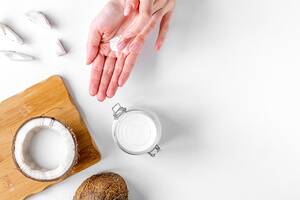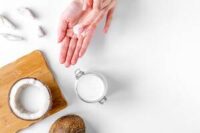
03 Jul Home Remedies To Help Manage Eczema
 Eczema, also known as atopic dermatitis, is a chronic skin condition characterized by dry, itchy, and inflamed skin. While there are various treatments available, many people turn to home remedies to manage their symptoms. In this article, several natural remedies for eczema are explored, some remedies that should be avoided are discussed and tips for treating eczema in babies and children are identified.
Eczema, also known as atopic dermatitis, is a chronic skin condition characterized by dry, itchy, and inflamed skin. While there are various treatments available, many people turn to home remedies to manage their symptoms. In this article, several natural remedies for eczema are explored, some remedies that should be avoided are discussed and tips for treating eczema in babies and children are identified.
Natural Remedies for Eczema
Home natural remedy for eczema may provide significant relief and improve the condition of the skin. Colloidal oatmeal, for instance, is renowned for its soothing properties, helping to alleviate itching and irritation. Simply adding it to a warm bath can create a calming treatment.
Another effective remedy is coconut oil, which hydrates the skin and may contain antibacterial properties that help prevent infection. Applying it directly to affected areas twice daily may make a noticeable difference.
Additionally, sunflower seed oil may strengthen the skin barrier and reduce inflammation when used as a moisturizer. Bleach baths, although sounding harsh, may reduce bacteria on the skin and are beneficial when used sparingly. Lastly, using a cool compress can provide immediate relief from severe itching and inflammation. These natural remedies are gentle yet effective ways to manage eczema symptoms and enhance overall skin health.
Contact a healthcare professional before using any natural remedy. They can help ensure the remedy fits safely within a treatment plan.
Remember allergic reactions can occur or develop to any product so be sure to monitor your skin for any new or unexpected reactions. Test any new product on a small area before applying to larger areas.
Colloidal Oatmeal
Colloidal oatmeal, made from finely ground oats, has been used for centuries to treat a variety of skin conditions. It can help to:
- Soothe irritated skin
- Reduce itching
- Provide a protective barrier
To use colloidal oatmeal, add it to bathwater and soak for 10-15 minutes. Alternatively, one can apply a colloidal oatmeal paste directly to the affected areas.
Bleach Bath
A bleach bath might sound harsh, but it can be beneficial for severe eczema by reducing bacteria on the skin that can cause infections. To prepare a bleach bath:
- Add 1/4 to 1/2 cup of household bleach to a full bathtub of lukewarm water. This is equivalent to about 1–2 teaspoons of bleach per gallon of water. Be sure to check the concentration of the bleach used.
- Soak for 5-10 minutes.
- Rinse thoroughly with fresh water.
- Avoid sharing towels.
Do not use bleach baths more than twice a week, and always consult your doctor before trying this remedy.
Vinegar Bath
Apple cider vinegar has anti-inflammatory properties that may help manage eczema symptoms. To use a vinegar bath:
- Add 2 cups of apple cider vinegar to a full bathtub of lukewarm water.
- Soak for 15-20 minutes.
- Rinse skin thoroughly.
Vinegar may help restore the skin’s natural pH balance and reduce itching.
Coconut Oil
Coconut oil is a popular natural moisturizer that may help alleviate eczema symptoms. It contains lauric acid, which has antibacterial properties. To use coconut oil:
- Apply virgin coconut oil directly to the affected areas.
- Use it twice daily, especially after bathing.
- Anyone who is allergic to coconuts should not use coconut oil.
Coconut oil may help to hydrate the skin and reduce the risk of infection.
Sunflower Seed Oil
Sunflower seed oil is another moisturizer that may protect the skin barrier and reduce inflammation. It may be applied directly to the skin:
- Apply a small amount of sunflower seed oil to the affected areas.
- Use it up to twice daily, particularly after bathing
- People who are allergic to sunflower seeds should avoid sunflower oil.
Sunflower seed oil is gentle and may be a great option for sensitive skin.
Petroleum Jelly
Petroleum jelly, also known as petrolatum, is a simple yet effective remedy for eczema. It helps to lock in moisture and protect the skin barrier. To use petroleum jelly:
- Apply a generous layer of petroleum jelly to the affected areas.
- Use it as needed, especially after bathing and before bed.
This remedy is appropriate for both adults and children.
Cool Compress
A cool compress may provide immediate relief from itching and inflammation. To use a cool compress:
- Soak a clean cloth in cool water.
- Wring out excess water and apply the cloth to the affected area for 10-15 minutes.
- Repeat as needed.
A cool compress may help to soothe the skin and reduce itching.
Eczema Remedies You Can Skip
While many home remedies may be beneficial, some are best avoided:
- Essential Oils: Some essential oils can irritate the skin and exacerbate eczema symptoms.
- Alcohol-Based Products: These can dry out the skin and worsen eczema.
- Scrubbing the Skin: This can lead to further irritation and damage to the skin barrier.
It’s important to choose remedies that are gentle and soothing for the skin.
Tips to Treat Eczema in Babies and Children
Eczema is common in babies and children. Here are some tips to help manage their symptoms:
- Use Mild Soaps and Detergents: Choose products that are fragrance-free and designed for sensitive skin.
- Keep Skin Moisturized: Apply a gentle moisturizer, such as petroleum jelly, multiple times a day.
- Avoid Overheating: Keep your child cool, as heat can exacerbate eczema symptoms.
- Dress in Soft, Breathable Fabrics: Cotton clothing is a good choice to prevent irritation.
- Trim Nails Regularly: This can prevent your child from scratching and causing further damage to their skin.
Consult with a pediatrician for additional advice and appropriate treatments for your child’s eczema.
Conclusion
Eczema can be a challenging condition to manage, but there are numerous home natural remedies for eczema that may help alleviate symptoms. From colloidal oatmeal and coconut oil to bleach baths and cool compresses, these remedies offer natural ways to soothe and protect the skin. Remember to avoid harsh treatments and consult with a healthcare provider before trying new remedies, especially for babies and children.
FAQs
Q: Can diet affect eczema? A: Yes, certain foods can trigger eczema flare-ups. Common triggers include dairy, nuts, and gluten. Keeping a food diary can help identify potential triggers.
Q: How often should I moisturize my skin if I have eczema? A: It’s important to moisturize at least twice daily, and more often if needed. Applying moisturizer after bathing can help lock in moisture.
Q: Can stress make eczema worse? A: Yes, stress is a known trigger for eczema flare-ups. Practicing stress-reducing techniques such as meditation, yoga, and deep breathing can help manage symptoms.
Q: Is it safe to use home remedies for eczema during pregnancy? A: Many home remedies are safe, but it’s important to consult with a healthcare provider before using any new treatments during pregnancy.
The information on MedicalResearch.com is provided for educational purposes only, and is in no way intended to diagnose, endorse, cure, or treat any medical or other condition.
Some links may be sponsored. Products are not endorsed.
Always seek the advice of your physician or other qualified health and ask your doctor any questions you may have regarding a medical condition. In addition to all other limitations and disclaimers in this agreement, service provider and its third party providers disclaim any liability or loss in connection with the content provided on this website.
Last Updated on July 24, 2024 by Marie Benz MD FAAD
